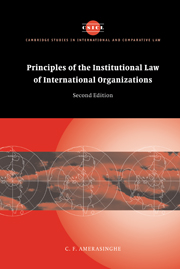Book contents
- Frontmatter
- Contents
- Preface
- List of abbreviations
- Table of cases
- 1 Introduction
- 2 Interpretation of texts
- 3 Legal personality
- 4 Membership and representation
- 5 Non-Judicial organs of organizations
- 6 Acts of non-judicial organs: their legal effect
- 7 Acts of non-judicial organs: the doctrine of ultra vires
- 8 Judicial organs
- 9 The internal law: employment relations
- 10 Privileges and immunities
- 11 Financing
- 12 Responsibility to and of international organizations
- 13 The liability of member states vis-à-vis third parties
- 14 Amendment of constitutions
- 15 Dissolution and succession
- 16 The settlement of disputes
- Index
- Cambridge Studies in International and Comparative Law
2 - Interpretation of texts
Published online by Cambridge University Press: 10 December 2009
- Frontmatter
- Contents
- Preface
- List of abbreviations
- Table of cases
- 1 Introduction
- 2 Interpretation of texts
- 3 Legal personality
- 4 Membership and representation
- 5 Non-Judicial organs of organizations
- 6 Acts of non-judicial organs: their legal effect
- 7 Acts of non-judicial organs: the doctrine of ultra vires
- 8 Judicial organs
- 9 The internal law: employment relations
- 10 Privileges and immunities
- 11 Financing
- 12 Responsibility to and of international organizations
- 13 The liability of member states vis-à-vis third parties
- 14 Amendment of constitutions
- 15 Dissolution and succession
- 16 The settlement of disputes
- Index
- Cambridge Studies in International and Comparative Law
Summary
The interpretation of constitutional texts of international organizations and other texts connected with their functions is important for the law of international organization. There is something in common between the process of interpretation of constitutional texts and of resolutions and decisions of the organs of international organizations, such as the General Assembly of the UN, the Executive Directors of the IMF or the IBRD and the secretariat of the UN, or the administration of the IMF or the IBRD. Resolutions and decisions of deliberative or representative organs are made under powers assigned by the basic constitutional texts, while those of the executive organ may be made either under similar powers or under powers virtually intended to give the administration or management delegated authority from the deliberative or representative organs.
Two areas of interpretation will be considered in this chapter: the interpretation of constitutional texts and the interpretation of decisions of organs. The interpretation of constitutional texts is by far the most important aspect of textual interpretation. Constitutional texts are treaties or conventions and must be interpreted as treaties or conventions, though there may be special considerations which are relevant and they may have special characteristics. What is relevant in the case of decisions and resolutions of deliberative or representative organs which are generally interpreted in the same way as constitutional texts is to identify certain, but few, important features which are special to their interpretation. There is a special case of delegated legislation which relates to employment within organizations.
- Type
- Chapter
- Information
- Publisher: Cambridge University PressPrint publication year: 2005

